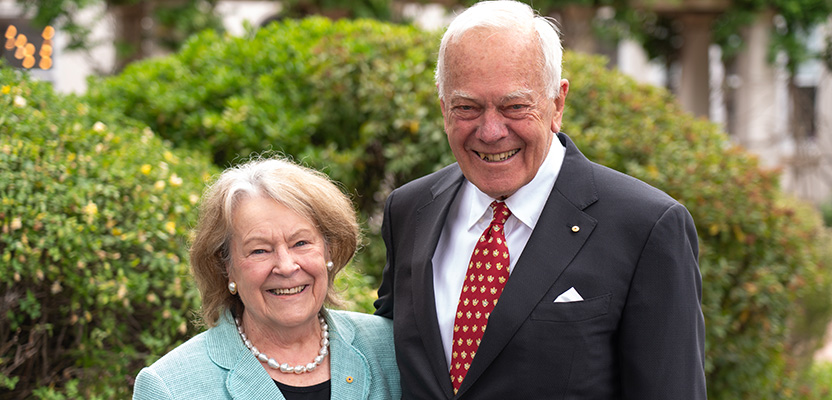The death of Queen Elizabeth II this month has reignited debate about the relevance of the monarchy in 21st century Australia. Now it is time for us to have a discussion, as a nation, about an Australian head of state.
By David Feith
When I was a child, and on occasions when we were sitting round the kitchen table talking about things like the monarchy and the Governor-General, Mum would often say that Grandpa would be good as the next Governor-General, and we generally agreed.
Why did we think Grandpa would be good as a Governor-General? Grandpa was nice, he was friendly, he liked children, he was kind and generous, he sometimes told funny jokes, he was wise, he was tolerant, fair, accepting, and we could talk about anything with him.
My grandfather was also a refugee, who had been forced to leave his home in Austria by the Nazi invasion because he was Jewish – though not religious. He used to say ‘Hitler made me Jewish’ – being Jewish was not so important to him until the rise of Nazism threatened his family and his life. With his wife and eight-year-old son he left his life in Vienna, came to Melbourne in 1939, and gradually made a new life here. He and Grandma grew to love Australia – they loved the bush and the mountains, and were always grateful to Australia that they had been accepted here as refugees, and able to make new lives here in safety. After some years Grandpa started his own business, which he successfully ran for decades, and worked in until he was in his 80s. However, it was more his personal qualities that we thought qualified him to be our next Governor-General.
Now it is time for us to have a discussion, as a nation, about an Australian head of state.
Do we need a head of state?
Do we want a head of state? If so, what should the head of state do? What should be the role of the head of state? Do we want just a ceremonial role, or something else? Do we want a head of state who can question decisions made by the Prime Minister, or the government, and act to caution or restrain the government?
How should we choose a head of state?
We need to think about the criteria to decide who is most appropriate to be an Australian head of state. We do not need to have a head of state with a military or sporting background – but we need to decide criteria on what would be necessary for an Australian head of state.
The choice of a head of state should not be based on race, gender, class, skin colour, or heredity. Does an Australian head of state need to be someone who is born in Australia? Could they be a migrant or refugee?
Or should an Australian head of state be Indigenous? Does an Australian head of state need to be someone who is one of the Australian First Nations?
Who should choose an Australian head of state?
There are several options on how to decide on an Australian head of state. Should that person be appointed? By whom? Should they be elected? By whom?
There are several models to consider for comparison and ideas: many other former British colonies that have gained independence and become republics. These include most notably the USA, India and Bangladesh, all of which have presidents, with differing roles, responsibilities and powers.
They include Caribbean nations (most recently Barbados), African nations (Kenya, South Africa), Asian nations (Pakistan, Sri Lanka, Singapore), and Pacific nations (Fiji, Tonga). There are 36 republics in the Commonwealth – out of 56 – all of which were formerly British colonies. We could look at how they have managed to decide on choosing a head of state; and also consider how we want to do this.
There are various ways to choose a head of state. For example, the president of the USA is elected, through a somewhat opaque, indirect process in which citizens vote for delegates to an Electoral College, and the members of the Electoral College vote for the President. The President of India is indirectly elected by an electoral college comprising both houses of the Parliament of India and the legislative assemblies of each of India’s states and territories, who themselves are all directly elected by the citizens. The president of Bangladesh is elected by the 350 members of Parliament. The President of South Africa is elected by the ³Ô¹ÏÍøÕ¾ Assembly, the lower house of Parliament, from among its members; and the chief justice oversees the election. Once elected, a person is no longer a member of the ³Ô¹ÏÍøÕ¾ Assembly. Clearly there are a range of options to consider when thinking about how an Australian head of state should be chosen.
We need to think about the role of the Australian head of state, the criteria for choosing an Australian head of state, and how we might select an Australian head of state. For any job nowadays, applicants have to be considered against selection criteria.
Unfortunately, my grandfather is no longer alive. If he were, we could consider him as a candidate for our first Australian head of state – not because he had been a refugee; not because he had been a successful businessman; but because of his personal qualities of wisdom, generosity, open-mindedness, fairness and dignity. These are the qualities I want in our Australian head of state.
David Feith is the Australian Greens’ International Secretary.
Hero image: .








